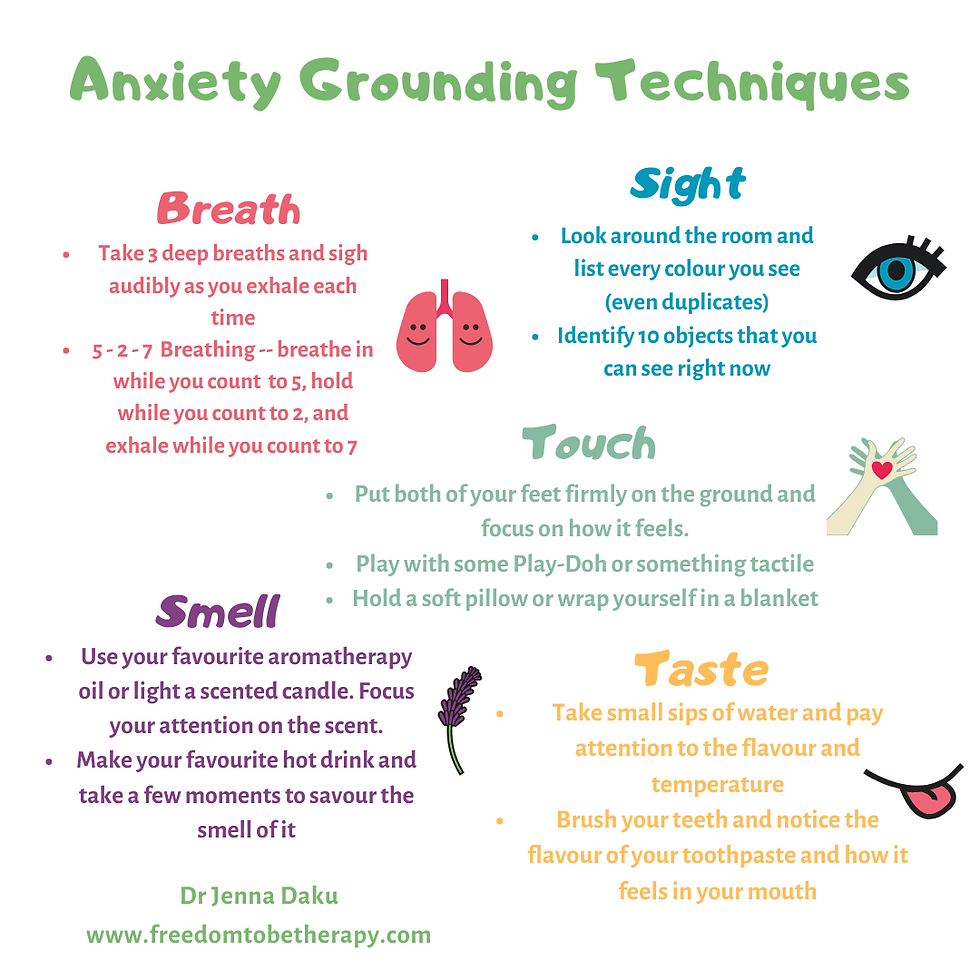Coping with an Eating Disorder during the COVID-19 pandemic
- Dr. Jenna Daku
- Mar 17, 2020
- 4 min read

If you have an eating disorder, or if you're struggling with disordered eating, the recent pandemic measures ( social distancing, self-isolation, staying home as much as possible ) is undoubtedly going to cause some anxiety for you. It's okay. The eating disorder gets loud when we are faced with something that's difficult to cope with and out of our control. But there's a few things I'd like for you to remember...
1) The eating disorder voice is NOT YOU. As much as it sounds like you, it's not. Eating disorders hijack your voice and use it against you. You can identify ED thoughts in several ways. The tone is mean, spiteful, and aggressive. Usually it says things to you that you'd never say to another human being. It also loves to use words like "should", "disgusting", "too much", "greedy", "unhealthy" when you're thinking about food, exercise, or your body.
2) The unkind, mean, spiteful thoughts that the ED throws at you are just thoughts. You can't control whether these thoughts pop in to your mind, but you can control what you do with them. Your power lies in how you respond to those thoughts. Here's a metaphor to help you understand:
3) Your power lies in how you choose to respond. The ED will get louder right now because it's a way of coping and feeling a sense of control during uncertain times. It's really tempting to listen to what the ED is saying to you because when you do, it goes temporarily silent. This is only ever temporary. Remember that the more you listen to the ED, the more power it gains over you so the worse you will feel in the long run.
4) Eating disorder recovery is NOT linear. Theres ill be ups and downs and you're NOT a failure if your ED is loud right now. An increased volume of ED thoughts is a sign that you need to amp up your coping skills and self-care. It's a sign that you're trying to cope with something difficult.
5) Eating disorder recovery is short term discomfort for long term freedom. When you have an eating disorder, especially during a time of crisis, the temptation is to opt for the short term relief that the ED offers. Remember that this is only temporary and it will only result in long term suffering.
6) There are lots of things you can do to help you cope with increased ED thoughts and behaviours. Reach out for support: B-eat is continuing with online support groups, you can find out more information here. Your treatment providers can offer you online sessions. And remember that your family and friends love you and they're only a phone call or video chat away. The ED won't want you to talk to them, but try to remember that the shame you experience when you speak about your relationship with food and your body are the eating disorder's way of keeping you trapped and feeling alone.
7) Stay on top of your anxiety symptoms, as they will fuel eating disorder behaviour. It's normal to have an increased heart rate, feel jittery, have a sore stomach, and to have racing thoughts when you experience anxiety. It's your body and mind preparing to protect you from real or perceived danger. There are ways that you can manage that, and they're known as grounding techniques. Here's a list of some:

8) Keep listening to podcasts for recovery inspiration. Dr Janean Anderson has an awesome podcast called "The Eating Disorder Recovery Podcast". It's available for free on iTunes.
9) Develop a new routine. The more flexible we can be, the more we will bend with the pressure that life throws at us. When you're struggling with an eating disorder it's important that you're eating regularly ( EVEN IF YOU BINGE / BINGE & PURGE ). Enlist your family, friends, or flatmates to help you to eat every 2 -3 hours.
It's also important to keep small regular things going in your routine: Make your bed every morning, shower and brush your teeth daily, get out of your pj's, water your plants etc.
Arrange for daily phone / video dates with friends and family members to help you stay socially connected.
Engage in something creative every day: Write out your thoughts, start a gratitude journal, make a collage, paint, draw, do a puzzle, play games...
10) Practice self-compassion. I know the eating disorder will hate this and you probably just cringed reading that, but all you have to do is try and reflect on how you speak to yourself. Is it how you'd speak to a friend or a loved one? If no, how would you say things differently to them? Practice, practice, practice. It also helps if you write it out.
Here's a worksheet that you can print off and fill in. It's to help you practice self-kindness during the pandemic if you're quarantined:

11) Write out your favourite inspirational quotes and coping statements. You can put them on post-it notes and stick them all over your room ( especially on the mirrors ). Here's some examples to get you started:
"My eating disorder doesn't define me"
"Nothing is permanent"
"Recovery is short term discomfort for long term freedom"
12) YOU GOT THIS. You just need to try and do one small thing every day to fight back against the eating disorder. Just one thing .
Even if you struggle through the next few weeks, and even if sh*t feels unbearable at times, try to remember that NOTHING IS PERMANENT -- even COVID-19. And you are not alone xx
J x







Comments